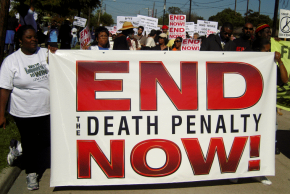A grim milestone in Texas
reports on protests surrounding Texas Gov. Rick Perry's 200th execution.
JUNE 2, 2009 marked a grim milestone in Texas. It was the date that Gov. Rick Perry oversaw the 200th execution carried out during his eight years as governor of Texas. To put this in perspective, George W. Bush, the previous governor, presided over 152 executions.
The statistics on the death penalty in Texas are shocking. Forty-six percent of Texas executions since 1982 have taken place during the last eight years. Four of the last five juvenile offenders put to death in the U.S. were executed in Texas, after Perry denied them clemency. Twelve inmates with severe mental illness were executed during this time period as well.
According to a report from Amnesty International:
Virginia is ranked second to Texas in executions. In 30 years, Virginia has killed 103 people in its death chamber, half the number put to death in Texas in eight years.
Texas is home to about 7 percent of the population of the U.S., and is where fewer than 10 percent of the country's murders occur. The state accounts for 37 percent of the U.S.'s executions since 1977, and 41 percent since 2001.

This milestone did not go unnoticed. Groups ranging from the Campaign to End the Death Penalty (CEDP), Texas Moratorium Network, Texas Death Penalty Abolition Movement (TDPAM), Texas Coalition to Abolish the Death Penalty (TCADP), Critical Resistance and others took part in protests or vigils throughout the state and the country. There were even international protests in Montreal, Canada; Liepzig, Germany; and Paris, France.
About 45 people came out to the old hanging tree in Houston to mark the 200th execution. The tree is a 400-year-old oak tree that has seen its share of hangings, mostly lynchings.
Speakers at the protest emphasized that this is not simply something we should mark and then go home, but rather that we need to continue to fight the death penalty every day. "[The death penalty] sends a bad message because killing is not the answer to killing," Gloria Rubac from TDPAM told Duetsche Presse-Agentur. "It also sends the message to make people wonder what in the hell is going on in Texas."
In Austin, approximately 45 protesters met at the Capitol to voice their disgust. Two hundred candles were lit to commemorate the victims of this barbaric practice. The names of the 200 men and women executed were read to a silent crowd.
The crowd chanted and expressed the anger felt by all. "I just think the fact that he's executing at such a speed, when the trend nationally is turning against capital punishment--shame on Governor Perry," Laura Brady of the CEDP said.
It will take the continued work of committed activists and our allies working together to finally abolish the death penalty in Texas--the death penalty capital of the U.S.


